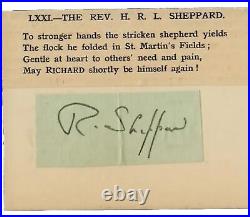RARE! St Martin-in-the Fields HRL Sheppard Clipped Signature


Hugh Richard Lawrie Sheppard, popularly known as'Dick' Sheppard, was born at Windsor Castle in September 1880. His father was one of the clergy of the castle's St George's Chapel.
Whilst pondering his career, Dick volunteered at the age of 18 for the Militia, the then equivalent of the Territorial Army, in which he was commissioned as a junior officer. Then, in early 1900, with the advent of the Boer War, Dick decided to enlist in the Imperial Yeomanry for South African service. As he set out one frosty morning to join his unit, the horse of his hansom cab slipped on the ice, and in the ensuing crash Dick's leg was so badly injured that he had a slight limp until the end of his life.
So ended the military career of the future famous pacifist. Instead, Dick went to Cambridge University and carried out voluntary work at local centres. After graduating he went to Oxford House in Bethnal Green, London to help run boy's clubs among other things. Later, Dick realised that he did have a priestly vocation, and after training he was ordained in 1907, returning to Oxford House as Chaplain and then as Head of the House, until a bout of asthmatic ill-health, which was recurrently to affect him all his life, forced him to resign in 1910. On recovery Dick served at various churches in the West End of London until in July 1914 he accepted the post of Vicar of St Martin-in-the Fields, Trafalgar Square. Before he could take it up, however, the First World War had been declared, and Dick accepted an invitation to be chaplain of a military hospital in France. Less than a week after arriving, the one time would-be soldier was writing home, War is awful.More awful than I supposed possible. One of the doctors described how Dick would identify himself with every dying man...
Sit there, just because he had promised the dying man that he would, just because he thought it might somehow comfort the poor fellow, who was long past any comfort really... Meanwhile, Dick's direct experience of war had not been without effect and it was in 1919 that he later said that he had become a pacifist.As a committed pacifist, he was concerned by the failure of the major nations to agree to international disarmament and on 16th October 1934, he had a letter published in the Manchester Guardian inviting men to send him a postcard giving their undertaking to renounce war and never again to support another. Within two days 2,500 men responded and over the next few weeks around 30,000 pledged their support for Sheppard's campaign.
In July 1935 he chaired a meeting of 7,000 members of his new organization at the Albert Hall in London (see programme below). Eventually named the Peace Pledge Union (PPU), it achieved 100,000 members over the next few months. The organization now included other prominent religious, political and literary figures including Arthur Ponsonby, George Lansbury, Vera Brittain, Wilfred Wellock, Reginald Sorensen, Max Plowman, Maude Royden, Frank P. Crozier, Alfred Salter, Ada Salter, Margaret Storm Jameson, Siegfried Sassoon, Donald Soper, Aldous Huxley, Laurence Housman and Bertrand Russell.